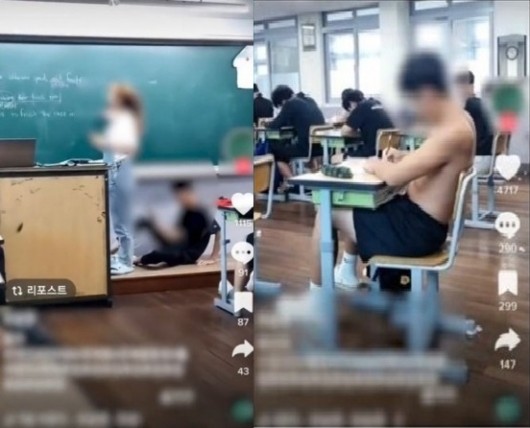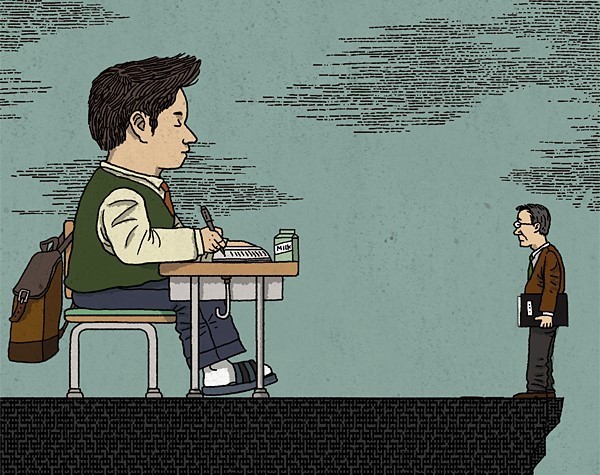South Korean teachers used to have an authoritative power that made everyone stand before them in awe. There was even a Korean saying that, ‘One should not even step on a teachers’ shadow.’ However, time has slipped by since those days and the perception of teachers has been damaged. A recent short video that went viral online, depicted a student laying on a teacher’s platform, where he appears to be filming her with his cell phone during class. The video was used as evidence that clearly indicates a loss of respect for teachers and reverence from their students.
 |
| ▲ The 20-second video of a student lying on a teacher’s platform while looking at his cell phone during class at a middle school quickly spread through SNS. (Photo from Newsis) |
The 20-second video of a student lying on a teacher’s platform while looking at his cell phone during class at a middle school in Hongseong-gun, Chungcheongnam-do, quickly spread through SNS, sparking this controversy. Internet users also raised suspicions that the student appeared to be filming the teacher because of the angle at which the video was filmed. In the second half of the video, we see another student taking class without a top on while another student asks, "Is this the right behavior?" and someone else even swore during class. Other students were in the class while the student lay on the platform, but no one stopped him from his unusual behavior. Internet users poured out criticism, saying, "Schools today are ruined." According to the Chungcheongnam-do Office of Education and the school, the student was charging his cell phone under the teacher who was writing on the blackboard on August 26, which was not included in the video. Later he went back to his seat in accordance with the instructions of the teacher. And the school explained, "It happened because the teacher and the student treat each other in a casual manner." In addition, the school explained that the student with no top, who appeared in the second half of the video, was cooling down after coming back from basketball and it was filmed on the 19th, not the same day. Despite the explanations, the school will hold a Teachers' Rights Protection Committee to deliberate on whether the students violate their teachers' rights. In addition, to check whether the student laying on the teacher’s platform filmed the teacher with his cell phone, the Chungcheongnam-do Office of Education submitted his device to the police with the consent of the student and asked the police to investigate whether it was filmed. It was reported that the teacher in question does not want to discipline the student.
This kind of infringement of teachers’ rights is becoming more frequent these days. According to the Ministry of Education on July 31, the number of acts of violation against teachers totaled 6,128 from 2019 to 2021 throughout the nation. While the nation saw a decrease in the number of teaching infringements in elementary, middle, and high school during the COVID-19 pandemic and fewer days with in person classes in school, the number once again increased to 2,269, two times more than last year with the resumption of face-to-face classes.
A question may arise as to whether there is a solution to the fall in the authority of teachers. In fact, there are no appropriate countermeasures at present. The first problem is the absence of explicit legal standards. There is a law that addresses any charges of infringement on the rights of teachers, called A Special Act for the Improvement of Teachers’ Status and Protection of Educational Activities. This law aims to reinforce punishment for those who infringe on the rights of teachers by imposing a penalty of changing classes or transferring the guilty student to another school. The law also takes measures to assist victims recover their authority with legal support from the Office of Education and to establish a committee to protect teachers’ rights. However, no measures get imposed unless teachers can actually prove the infringement they experienced. It is actually difficult to prove such infringement due to the lack of clear standards, so the existing law isn’t yet considered adequate.
Another problem is the marginalization of public education. South Korea’s private education market is outrageously large. Accordingly, public education has been marginalized and the status of schools and teachers shifted considerably. The quality that students pursue from teachers became not teaching them lessons and helping them grow as humans, but rather solely giving them useful information for exams. A school is no longer a well-rounded educational institution for students, but rather a tool that helps them get into university.
 |
| ▲ Teachers’ Rights Lost in South Korea (Photo from Chosun Ilbo) |
The Dankook Herald interviewed Professor Oh Hui-jeong from Dankook University’s Dept. of Teacher Education to learn more about the current status of teachers’ rights through the eyes of an educator. First, the response from the education field about amendment propositions to the ‘Elementary and Secondary Education Act’ and the Special Act Regarding Teacher Status was, that they were, "The first step towards solving the neglected issue of teachers’ rights violations." However, there were opinions that the bill is impractical due to compassion for the educational field, teacher accountability, and the high level of morality expected of the teacher socially. Therefore, Professor Oh expressed the need for follow-up laws and student guidance plans from the Ministry of Education level. Second, the protection of teachers’ rights in other countries is extremely different. In the United States, the law varies from state to state, but all had a strict liability for infringement of teaching rights and held them more accountable for their actions than other similar crimes. In the UK, teachers have the legal authority to discipline students both in and outside school. Japan, where educators are facing serious infringements on teaching rights by parents, the government is implementing school faculty mental health measures including both individual and structural support.
Third, teachers have difficulty disciplining students properly and have few protective measures against violations. According to a survey conducted by the Korean Federation of Teachers’ Associations, 34.1 percent of the respondents said the biggest difficulty that teachers face after students’ problematic behavior is that ‘there is no suitable way to take measures, such as imposing sanctions.’ Measures to prevent teachers from leaving the profession are also insufficient as only private teachers’ organizations are subsidizing litigation costs or therapy. Moreover, many teachers are reluctant to solve the problem officially because of the social expectations of teachers and the fact that it is reported to the provincial offices of education. To solve these problems, there must be institutional support and preparation of countermeasures by the Ministry of Education, incentives for the school to solve the matters, and research of overseas cases for reference. Ultimately, Professor Oh emphasized that a respectful school climate is necessary to restore the collapsed teachers’ rights and that each role and effort by every institution, educational and social community is vital.
The disintegration of the relationship between teachers and students must not be overlooked. It requires mutual respect and trust. It is imperative to establish alternative policies in order to avert such breakdowns and stabilize public education. As the infringement of teachers’ rights takes place in schools and other such institutions that foster individuals, Dankookians (Students of Dankook University) should not remain indifferent and should work together to remedy the issue.
구시현, 김혜선, 김서현, 이승준 dankookherald@gmail.com

![[Campus Magnifier] Let's Surf the Library!](/news/photo/202404/12496_1765_4143.jpg) [Campus Magnifier] Let's Surf the Library!
[Campus Magnifier] Let's Surf the Library!
![[Campus Magnifier] Let's Surf the Library!](/news/thumbnail/202404/12496_1765_4143_v150.jpg)





